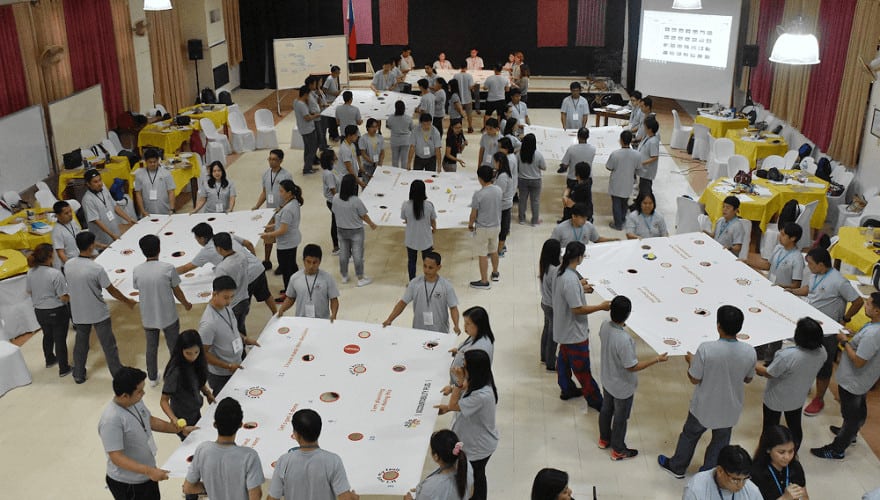Filipino values get tested in real life, especially when pressure rises—because it’s easy to talk about values and hard to live them when work gets messy. In this article, Jef Menguin reflects on Filipino values like bayanihan and why they must travel with us as we grow and modernize. Read it, practice one value this week, and share it at work so culture becomes behavior, not just tradition.
Here are my reflections on Filipino values. Progress doesn’t mean abandoning Filipino values. Yes, what got us here won’t necessarily get us there. But, it’s not about changing who we are. Our core values are our strength, the glue that holds us together. They’re part of our identity, our foundation.
We may need to rethink, maybe even redefine some values. But they must travel with us as we grow.
Filipino values are not just relics of the past; they are beacons for our future. Our values are our guide as we evolve as a nation, helping us navigate change while staying true to ourselves.
Bayanihan in Good Times
Bayanihan, the spirit of communal unity, is often seen as a crisis response. But it’s more. It’s about collaboration, not just in tough times, but always.
It is about being proactive, not reactive. When we’re at our best, that’s the perfect time for bayanihan.
Think about it. Bayanihan is about co-designing our future. It’s about engaging in community projects, not waiting for problems to arise. It’s building, growing, improving together. It’s not about responding to disasters, but about creating a thriving community.
Being a good citizen is bayanihan too. It’s about doing the right thing, always. Paying taxes correctly and on time is a prime example. It’s a contribution to the collective good, based on our ability.
Bayanihan isn’t just helping during calamities. It’s a daily practice. It’s about contributing what we can, when we can. It’s about lifting each other up, in good times and bad.
So, let’s redefine bayanihan. It’s not just about lifting houses; it’s about lifting communities.
Every day, in every way we can. That’s true bayanihan. It’s proactive, collaborative, and constant. It’s about making our country better, together.
Pakikisama Adds Value
Pakikisama is about belonging, about being part of a community. It’s about the feeling you get when you’re welcomed into a new place.
Whether it’s a neighborhood, a church, a school, or a workplace, it’s about that sense of connection. It’s about finding your place among your people.
But pakikisama is more than just fitting in. It’s active participation – or pakikilahok. It’s being there; it’s being involved. It’s about integrating into the community and contributing something valuable.
True pakikisama means adding value to the community. Make the group stronger because you’re a part of it. Enhance the collective, not just join it. You’re not just there; you’re a vital part of the growth.
This isn’t about ego. It’s about service. Be willing to contribute to others, to make things better for everyone. That’s the essence of pakikisama. You are not just a member; you are a multiplier of value.

Taking Care of Family
I love my family, and providing for them is a priority. In the Philippines, ‘family’ is a broad term. It often includes those not related by blood. This extended family network is a core part of our culture.
But there’s a balance to strike. While it’s vital to care for our family, dependence shouldn’t be the norm.
Each of us should aim to contribute, to add value. It’s like pakikisama, but within the family unit. It’s about strengthening the family, not just relying on it.
Our goal? To foster respect and love within the family. To support each other, not just financially, but in all ways. It’s not just about being a family; it’s about being a productive, loving unit that uplifts each member.
Aim for collective prosperity. Help each other to thrive, not just survive. It’s about more than just making ends meet; it’s about building wealth and well-being together.
The family is the cornerstone of our nation. Strong, self-reliant families lead to a stronger country. When each family grows, the Philippines grows.
That’s the power of family values.
Discover the Filipino values that shape how we work, lead, and live—beyond slogans and speeches. Get the Values Starter Kit. Read the series, choose one value to practice this week, and watch how small shifts create real change.
From Utang na Loob to Paying Forward
Utang na loob is a Filipino value representing gratitude. It’s about acknowledging those who’ve helped us. The beauty of this value lies in the heart of the giver, who expects nothing in return.
But there’s a fine line. When someone expects repayment, it shifts. It’s no longer utang na loob but a simple debt, a transaction. And once that debt is paid, the deeper connection often fades. That’s not what utang na loob should be.
Unfortunately, some abuse this value. They hold utang na loob over others, creating a burden rather than a bond. This misuse distorts a beautiful aspect of Filipino culture.
It’s time to change that narrative.
Generosity should inspire more generosity. It’s a cycle, not immediate, but eventually, it returns more than what was given. Let’s see utang na loob as an opportunity to pay it forward. True generosity doesn’t seek direct repayment.
The best way to honor utang na loob?
Pay it forward. Let the giver’s kindness inspire your own. The genuine givers are happy seeing their kindness ripple outwards. That’s the true spirit of utang na loob. It’s a cycle of generosity, not a chain of debts.
Bayanihan in Filipino Families
In Filipino families, the eldest often bears a heavy burden. They’re expected to support their siblings, sometimes at the cost of their own dreams.
I don’t know the statistics of unmarried eldest daughter or son. But I heard many stories.
Being sent to school first shouldn’t be seen as utang na loob. It’s about love, a gift, not a debt. Yet, the weight of this ‘gift’ can be immense. It’s a loan of life and happiness, paid with high interest.
The eldest’s job often signals retirement for the parents. This tradition needs rethinking.
Everyone in the family should contribute. It’s not just the eldest’s responsibility. When all work, escaping poverty becomes feasible. Relying on one person is unfair and unsustainable.
Family bayanihan means everyone pitches in.
Every additional income is a vital asset. Utilize all resources to build family wealth. Share the load. It’s about growing together, not overburdening one. This collective effort can change the family’s future, turning duty into opportunity.
If you want Filipino values to show up as real behavior at work…
Let’s turn it into a culture shift experience.
→ Shift Experiences




